In-Depth Review of Leading AI Prompt Marketplaces

AI prompt marketplaces are transforming how businesses use AI tools by offering ready-to-use templates that save time and improve efficiency. This article reviews five popular platforms - God of Prompt, PromptBase, AIPRM, PromptHero, and FlowGPT - based on pricing, prompt quality, specialization, and usability.
Key Takeaways:
- God of Prompt: Offers bundled prompt collections with lifetime updates, starting at $37. Best for businesses needing a wide range of prompts and educational resources.
- PromptBase: A pay-per-prompt system ($2–$10 per prompt) with custom options up to $150. Ideal for specific, occasional needs.
- AIPRM: A browser extension integrating directly with ChatGPT, focusing on marketing and SEO prompts. Subscription-based.
- PromptHero: Specializes in visual content for artists and designers. Freemium model with premium options.
- FlowGPT: Combines a token-based pricing system with AI model execution, offering flexibility but requiring close token management.
These platforms cater to different needs, from solopreneurs seeking affordable tools to enterprises looking for comprehensive solutions. Below, we compare their features to help you choose the right one for your goals.
Turn Prompts Into Passive Income | PromptBase Review
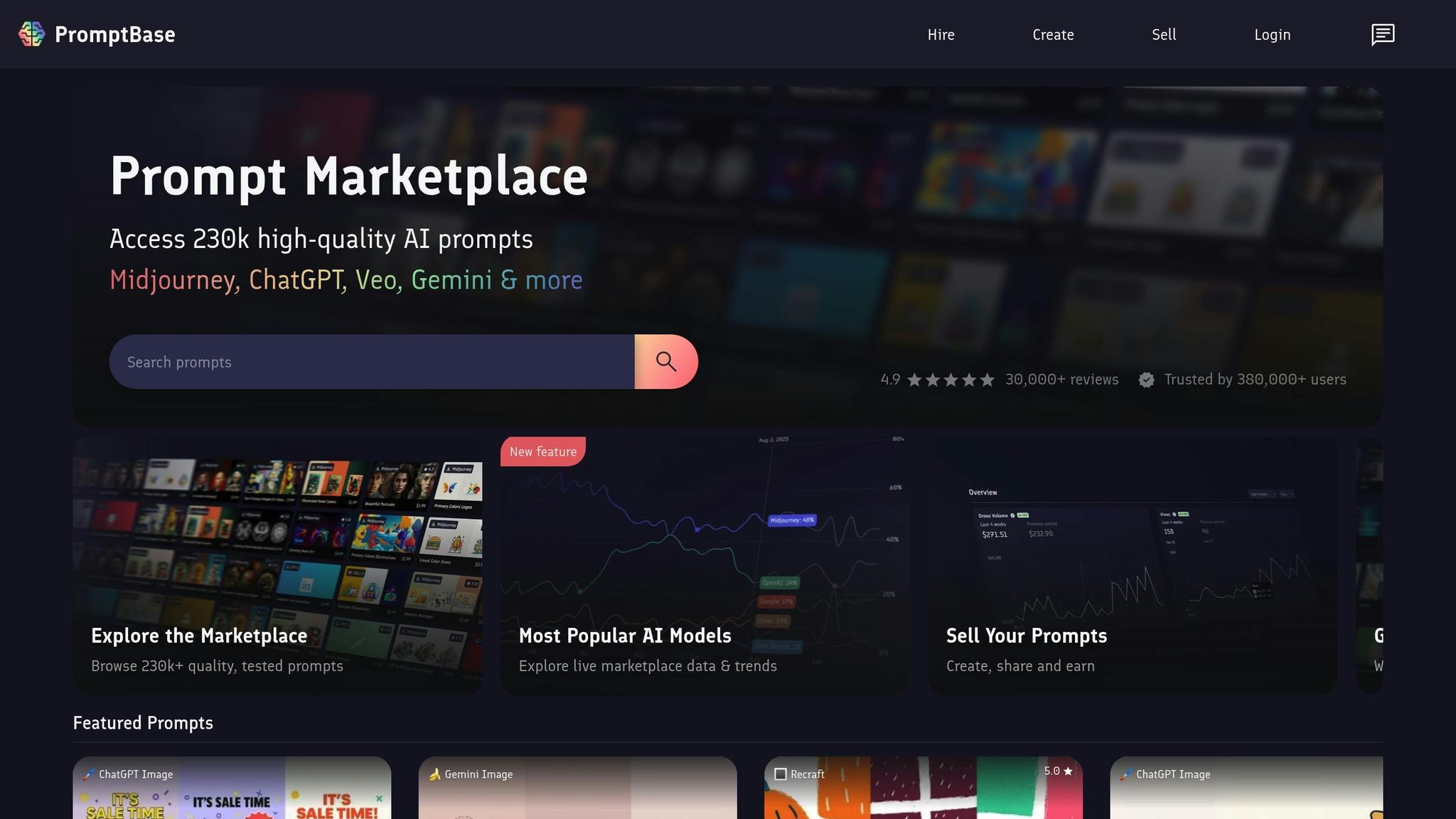
1. God of Prompt
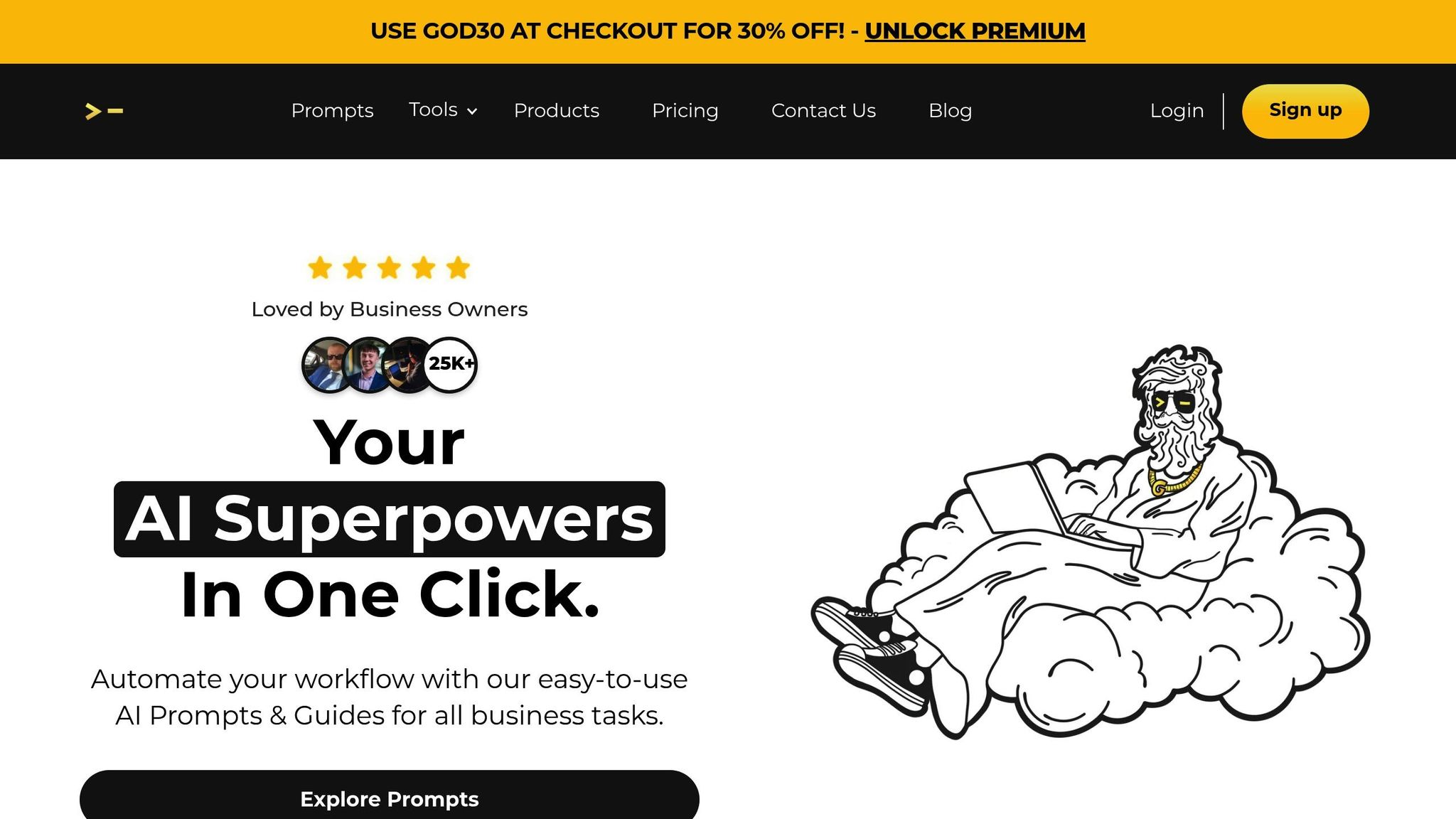
God of Prompt is an AI platform designed to help U.S. businesses integrate AI tools seamlessly into their workflows. Instead of selling prompts one by one, it offers bundled collections of prompts alongside educational guides, making it easier for businesses to adopt and maximize AI-driven solutions.
Pricing Models
Rather than charging per prompt, God of Prompt uses a tiered bundle system. It starts with a free plan, which includes over 1,000 ChatGPT prompts and more than 100 Midjourney prompts. For those looking for more, there are four paid tiers:
- Writing Pack: $37.00
- ChatGPT Bundle: $97.00
- Midjourney Bundle: $67.00
- Complete AI Bundle: $150.00
This structure ensures businesses can choose a plan that aligns with their specific needs without paying for unnecessary features. All plans come with lifetime updates, so a one-time purchase guarantees access to new content as it's added. Plus, the platform offers a 7-day money-back guarantee, giving users peace of mind as they explore AI integration.
Prompt Quality
The platform’s standout feature is its "Mega-Prompts" - detailed templates designed to handle a wide range of business tasks. These prompts are categorized into areas like marketing, finance, e-commerce, education, sales, and productivity, making them highly relevant for professional use.
All prompts are delivered through a Notion workspace, which not only keeps everything organized but also makes it easy to search and find exactly what you need. This focus on quality and usability sets God of Prompt apart as a valuable resource for businesses.
Niche Specializations
God of Prompt is compatible with several leading AI systems, including ChatGPT, Claude, Grok, Veo, Sora, Midjourney, and Gemini AI. This wide compatibility ensures businesses can use the platform alongside their preferred AI tools.
In addition to prompts, the platform provides educational resources like how-to guides, tutorials on prompt engineering, and a custom GPTs toolkit. The Complete AI Bundle is particularly versatile, offering resources tailored for a variety of business needs, including specific tools for solopreneurs aiming to build in-house AI capabilities.
Usability
All of God of Prompt’s content is delivered via Notion, offering a user-friendly interface with robust search options and clear categories. This setup ensures quick and easy access to prompts.
For businesses opting for the top-tier plan, there’s an added bonus: unlimited custom prompt generation. This feature allows users to request tailored prompts to meet their unique needs. Additionally, the platform includes an AI tools directory to help users discover and integrate new AI solutions, further enhancing its value for businesses looking to streamline their operations with AI.
2. PromptBase
Launched in June 2022, PromptBase became the first online marketplace dedicated to buying and selling AI prompts, quickly establishing itself as a major player in this niche. It operates much like a traditional marketplace, where individual creators list their prompts for sale. Unlike bundled models, this setup offers a more tailored experience for users seeking specific solutions.
Pricing Models
PromptBase follows a pay-per-prompt pricing system, with individual prompts typically priced between $2.00 and $10.00. For those needing something more customized, the platform provides access to "quick engineers" who can craft bespoke prompts for as much as $150.00 per prompt.
The platform takes a 20% commission on each sale, leaving sellers with 80% of the revenue. Once sellers hit 25 sales, they can become "quick engineers", gaining the ability to set their own rates. Payments are handled through Stripe. Compared to competitors, this commission structure is relatively seller-friendly - Prompt Attack charges 30%, while AI Frog takes 25%.
Prompt Quality
PromptBase prioritizes high-quality, curated prompts designed by experienced creators. The platform’s community is skilled in crafting effective prompts tailored to specific AI models, which helps users avoid the trial-and-error process often associated with creating prompts from scratch. That said, the database is smaller than some newer competitors, which might limit options for users with highly specific or niche needs.
Niche Specializations
PromptBase focuses on prompts for popular AI models like DALL·E, GPT, Stable Diffusion, and Midjourney. It caters to both text-based and image-generation tools, making it versatile enough for a variety of creative and professional applications.
The marketplace organizes its prompts into categories such as:
- Art and illustrations
- Logos and icons
- Graphics and design
- Photography and content creation
- Marketing and business
- Games
- 3D
This structure allows users to quickly navigate to prompts that match their specific industry or project. Additionally, the ability to filter by AI model simplifies the process of finding compatible prompts.
Usability
The platform’s interface is straightforward, allowing users to browse by category, filter by AI model, and purchase prompts individually. While this pay-per-prompt model ensures users only pay for what they need, it does require separate transactions for each purchase. This setup is particularly well-suited for occasional users or those with one-off needs, though it might be less convenient for businesses requiring frequent prompt acquisitions.
3. AIPRM
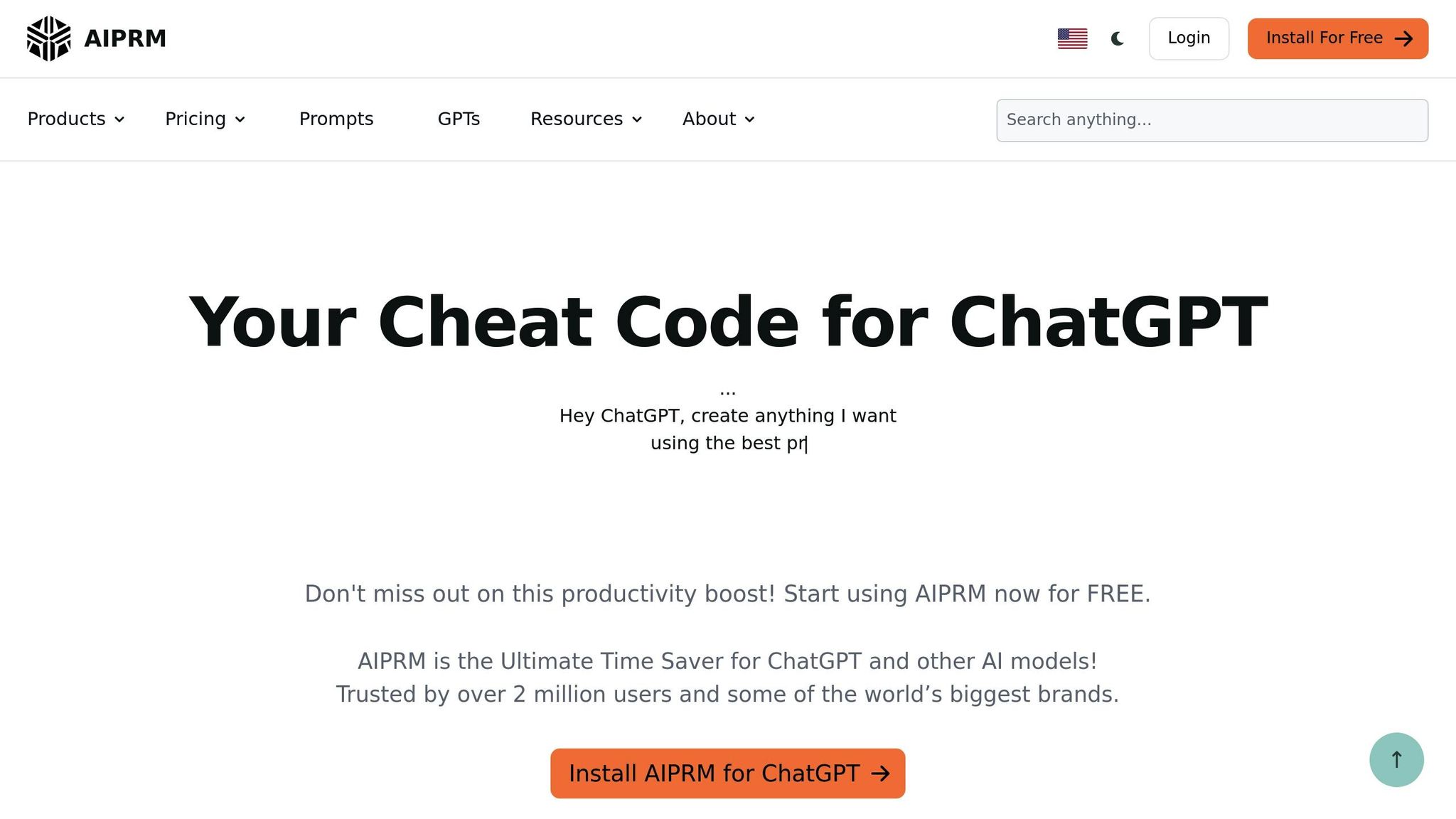
AIPRM is a browser extension that integrates directly into ChatGPT and similar AI platforms, bringing a curated library of prompts right into your workflow. Instead of acting as a separate marketplace, it embeds these prompts within the tools you already use, making them easily accessible. This integration streamlines the process, creating a smooth and efficient experience for users.
Prompt Quality
AIPRM prioritizes high-quality prompts tailored for professional use. These prompts are crafted to deliver consistent, measurable results - an essential feature for businesses that depend on reliable outputs for internal projects and client-facing deliverables. It has become especially popular with digital marketers and agencies that need dependable, well-tested prompts to meet their goals.
Niche Specializations
AIPRM stands out for its focus on marketing, SEO, sales, and content creation. Its "Best For" category highlights its emphasis on SEO and marketing workflows within ChatGPT. This makes it a go-to tool for teams aiming for consistent, actionable results from their AI interactions. By concentrating on practical business needs, AIPRM supports professionals looking for reliable outputs that fit seamlessly into their established processes.
Usability
The extension’s design enhances usability by allowing users to access the prompt library directly within ChatGPT. This eliminates the hassle of switching between platforms, saving time and effort. For professionals who rely on AI tools daily, this direct integration simplifies their workflow, making it faster and more efficient to find and use effective prompts.
sbb-itb-58f115e
4. PromptHero
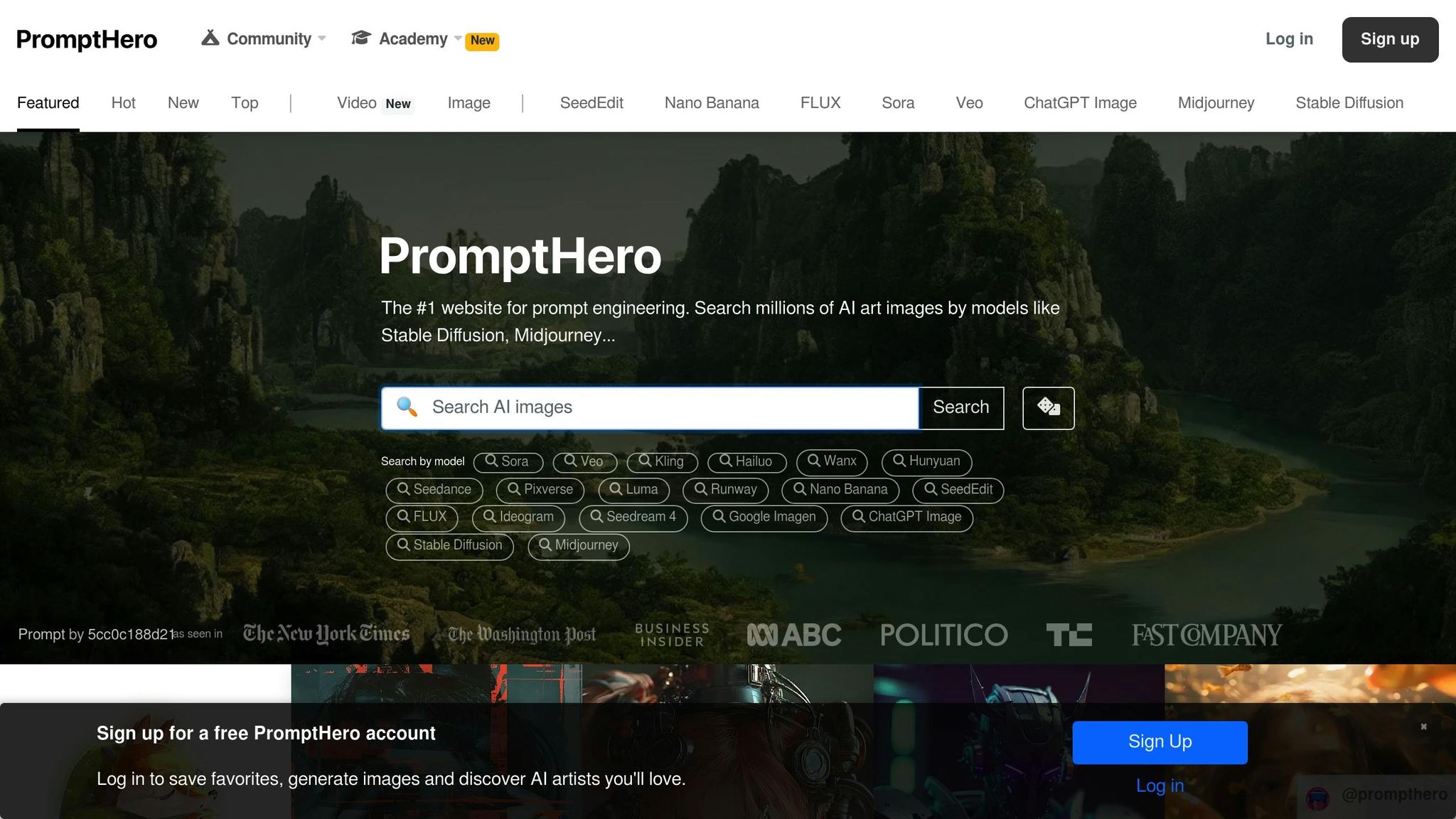
PromptHero stands out by zeroing in on visual content, carving a niche in the world of digital art and storytelling. Catering to artists, designers, and other creative professionals, it provides a specialized marketplace for visual AI prompts. This platform's emphasis on artistic and visually-driven prompts showcases the variety of approaches found in today's AI prompt marketplaces, offering tools specifically designed to inspire and elevate creative work.
5. FlowGPT
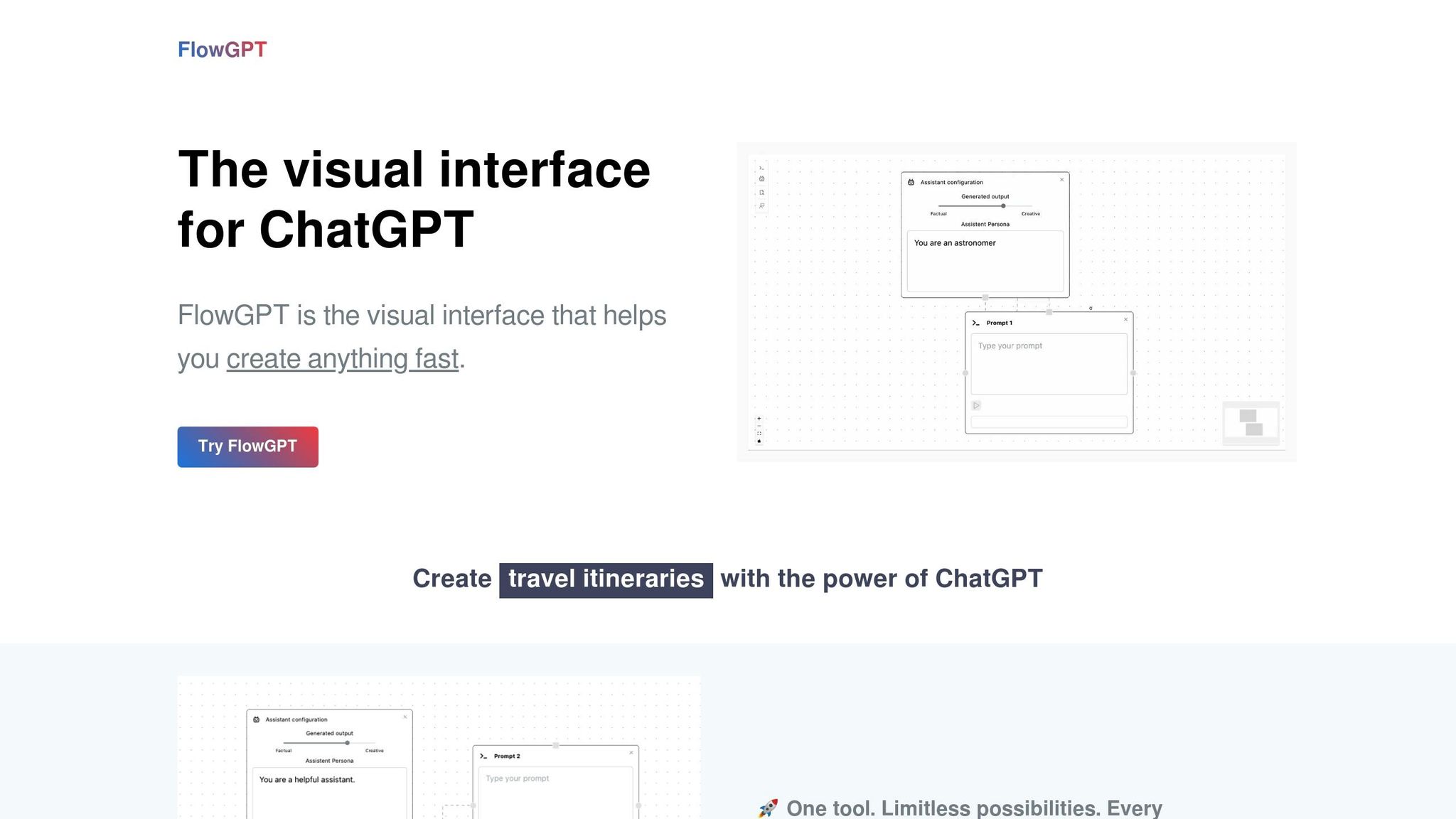
FlowGPT combines a marketplace with built-in AI model execution, reflecting the growing demand for user-friendly, integrated prompt solutions. Beyond just sharing prompts, the platform allows users to interact directly with AI models, blending exploration with practical application.
Pricing Models
FlowGPT uses a token-based pricing system, offering more flexibility compared to traditional subscription plans. It employs two types of virtual tokens: "Flux" tokens for advanced AI models (like image generation) and "Mochi" tokens for its mobile app context. For instance, users can purchase token packs, such as 500 tokens for $49.99 or 1,000 tokens for $89.99. This pay-as-you-go approach is especially appealing for users with irregular usage patterns or those who prefer detailed spending control. However, pricing details are scattered across different pages, meaning users need to carefully track token consumption for various models. While the system is flexible, it requires close monitoring to align usage with costs.
Prompt Quality
FlowGPT stands out by offering a large collection of free prompts. This library gives users the chance to experiment and evaluate prompt performance before committing to paid tokens. Since the prompts come from a diverse community, their quality can vary. Community feedback plays a key role in helping users identify the most effective options.
Niche Specializations
FlowGPT takes a unique approach by focusing on lightweight AI applications with integrated multi-model chat features. Unlike traditional prompt marketplaces such as PromptBase and PromptHero, which mainly facilitate buying and selling individual prompts, FlowGPT combines prompt sharing with direct AI model execution. This allows users to test and refine their prompts within the same environment where they'll be applied, creating a more seamless and functional experience.
Usability
The platform’s usability revolves around its token system, which requires users to keep an eye on token consumption rates. Since different models consume tokens at varying rates, the lack of a straightforward token-to-usage guide can make budgeting tricky. To get the most out of FlowGPT, users should regularly review their token usage and pricing details - especially for features like image generation. Testing usage over a week can also help predict monthly expenses more accurately.
Platform Comparison: Pros and Cons
Every AI prompt marketplace has its own strengths and weaknesses, tailored to fit different workflows and budgets. Let’s break down the pricing models, focus areas, and challenges of each platform.
God of Prompt stands out with its all-in-one bundles that include extensive AI prompt collections, educational materials, and lifetime updates. While this setup eliminates recurring fees, it may not appeal to users who prefer purchasing prompts individually.
PromptBase takes a pay-per-prompt approach, making it a good fit for users with occasional, specific needs. However, frequent use can cause costs to add up quickly.
AIPRM integrates directly with ChatGPT via a Chrome extension and operates on a subscription model. This setup streamlines workflows for ChatGPT users but is primarily focused on prompts for that platform.
PromptHero uses a community-driven freemium model, offering both free and premium prompts. It’s particularly suited for creative and visual applications, though navigating the platform can be tricky due to the sheer volume of content.
FlowGPT introduces a token-based pricing system, offering a flexible pay-as-you-go option. This model works well for irregular usage but requires careful tracking of token consumption to avoid overspending.
| Platform | Pricing Model | Best For | Main Limitation |
|---|---|---|---|
| God of Prompt | Bundle‑based (free & various bundles) | Comprehensive AI workflows | Limited flexibility for single purchases |
| PromptBase | Per‑prompt pricing | Occasional, specific needs | Costs can add up with frequent use |
| AIPRM | Subscription‑based | Seamless ChatGPT integration | Primarily focused on ChatGPT prompts |
| PromptHero | Freemium model | Creative and visual prompt use | Navigation can be challenging due to content volume |
| FlowGPT | Token‑based | Flexible for varied usage | Requires careful token management |
The platforms also differ in quality standards. God of Prompt delivers curated, educational content, while PromptBase relies on seller-driven variability. AIPRM focuses on ChatGPT integration, and PromptHero shines in creative and visual prompts.
In terms of usability, God of Prompt uses a Notion-based delivery system, which is highly organized but may feel overly structured for individual users. AIPRM offers smooth integration with ChatGPT through its Chrome extension, while FlowGPT provides flexibility but demands active token management.
For budget-conscious users, the choice boils down to pricing structures. God of Prompt offers lifetime updates with its bundles, avoiding recurring fees, while subscription or pay-per-use models like those from PromptBase and AIPRM can lead to higher costs over time.
On an enterprise level, organizations seeking comprehensive solutions and predictable costs might favor platforms like God of Prompt, while teams with specific or occasional needs may find platforms like PromptBase or FlowGPT more suitable. These comparisons help you align your choice with your operational goals and financial considerations.
Final Recommendations
After reviewing the options above, here are some tailored suggestions to help you choose the best AI prompt marketplace for your business needs.
For established businesses and agencies, the Complete AI Bundle priced at $150.00 is a solid choice. It includes over 30,000 prompts across areas like business, marketing, finance, e-commerce, and productivity. Plus, it offers lifetime updates, eliminating the hassle of recurring subscription fees. This bundle is ideal for organizations that need a wide range of prompts paired with integrated educational guides to support their operations.
For solopreneurs and freelancers working with a tighter budget, starting with the free tier is a smart move. It provides access to a variety of prompts, allowing you to test the platform's quality before committing to a purchase. If you’re ready to invest, the Writing Pack at $37.00 is a budget-friendly option, offering tools tailored for content creators and copywriters.
For marketing agencies and creative teams, specialized bundles can make all the difference. The Midjourney Bundle at $67.00 is perfect for those focused on visual content creation, while the ChatGPT Bundle at $97.00 is designed for businesses that rely on text-based AI for tasks like customer service, content production, and operational support.
For enterprise-level organizations, the Complete AI Bundle is a top recommendation. It provides full coverage, predictable costs, and lifetime updates, ensuring your tools stay relevant as AI technology advances. The Notion-based delivery system is particularly useful for team collaboration, keeping everything organized and accessible.
When deciding, remember that bundle-based pricing can save you money in the long run compared to ongoing subscription fees. Free options are a great way to test the waters before committing to a larger investment. Since Notion is central to the platform’s organization, make sure your team is comfortable using it. Ultimately, choose a bundle that aligns with your team’s specific needs and how often they’ll use the tools to maximize value over time.
FAQs
How can AI prompt marketplaces help businesses work more efficiently with AI tools?
AI prompt marketplaces make life easier for businesses by providing ready-made prompts designed for different AI tools. Instead of starting from scratch, teams can quickly find what they need, saving both time and energy to focus on more critical tasks.
These marketplaces also help businesses fine-tune their workflows, boost the quality of AI outputs, and cut down on the guesswork involved in creating effective prompts. This simplifies the process of incorporating AI into everyday operations while ensuring reliable and consistent results.
What should I look for when selecting an AI prompt marketplace for my business?
When choosing an AI prompt marketplace, it’s important to weigh a few critical factors, such as pricing options, prompt quality, and any specialized offerings that cater to your industry. You’ll also want to assess how intuitive the platform is and whether it fits smoothly into your current workflows.
Look for marketplaces with transparent pricing plans that align with your budget. Equally important is ensuring the platform’s usability - opt for one that simplifies your processes and saves you time. Above all, focus on platforms that deliver high-quality, relevant prompts tailored to meet your specific business goals.
What is FlowGPT's token-based pricing model, and how does it compare to traditional subscription plans?
FlowGPT operates on a token-based pricing system. Instead of a fixed monthly or annual subscription, users purchase tokens to unlock specific features or prompts. This setup offers greater flexibility since you only pay for what you use, avoiding the need for ongoing commitments.
This model is particularly budget-friendly for users with occasional or irregular needs. However, it might feel less straightforward for those who require frequent access, as keeping track of token usage can be an extra task. Ultimately, it’s a good fit for anyone looking to tailor their spending to match their individual usage patterns.























